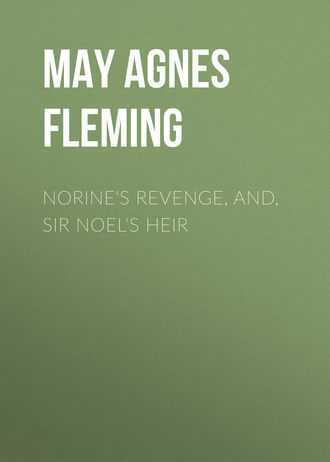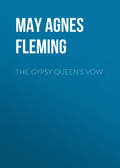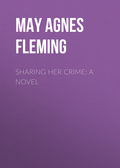
May Agnes Fleming
Norine's Revenge, and, Sir Noel's Heir
The dark eyes looked up at him; the gravely quiet voice spoke.
"His name is Laurence Thorndyke."
CHAPTER XVII.
A LETTER FROM PARIS
It is a sunny summer afternoon. The New York pavements are blistering in the heat, and even Broadway looks half deserted. Up-town, brown stone mansions are hermetically sealed for the season, the "salt of the earth" are drinking the waters at Saratoga, gazing at the trembling rapids of Niagara, or disporting themselves on the beach at Long Branch. The workers of the earth still burrow in their city holes, through heat, and dust, and din, and glare, and among them Richard Gilbert.
He sits alone this stifling August afternoon, in his down-town office. The green shades that do their best to keep out the white blinding glare and fail, are closed. The windows stand wide, but no grateful breeze steals in. He sits at his desk in a loose linen coat, multitudinous documents labelled, scattered, and tied up before him. But it is a document that does not look legal, that is absorbing his attention. It is a letter, and the envelope, lying beside him on the floor, bears the French postmark. He sits and re-reads with a very grave and thoughtful face. "It is queer," he is thinking, "uncommonly queer. She must be an adventuress, and a clever one. Of course she has wheedled him into making a new will, and the lion's share will go to herself. Hum! I wonder what Thorndyke will say. Come in."
He pushes the paper away, and answers a discreet tap at the door.
"Lady and gentleman to see you, sir," announces a clerk and the lady and gentleman enter.
"Hope we don't disturb you, squire," says the gentleman, and Mr. Gilbert rises suddenly to his feet. "Me and Hetty, we thought as how it would keinder look bad to go back without droppin' in. Hot day, squire – now ain't it?"
"My dear Miss Kent – my dear Uncle Reuben, this is an unlooked-for pleasure. You in the city, and in the blazing month of August. What tempted you?"
"Well, now, blamed if I know. Only Hetty here, she's bin sorter ailin' lately, and old Dr. Perkins, he said a change would do her a heap of good, and Hetty, she'd never seen New York, and so – that's about it. Squire! we've had a letter."
He says it abruptly, staring very hard straight before him. Aunt Hetty fidgets in her chair, and Richard Gilbert's pale, worn face grows perhaps a shade paler.
"A letter," he repeats; "from her?"
"From her. Two letters, if it comes to that. One from this here town last Christmas – t'other from foreign parts a week ago. I want to show 'em to you. Here's number one."
He takes a letter in an envelope from his pocket, and hands it to the lawyer. It seems almost a lifetime ago, but the thrill that goes through Richard Gilbert at sight of that writing still!
"Last Christmas," he says glancing at the postmark, a shade of reproach in his tone. "And you never told me!"
"I never told you, squire. It ain't a pleasant sort of thing to talk about, least of all to you. She doesn't deserve a thought from you, Mr. Gilbert – "
The lawyer stopped him with a gesture.
"I have forgiven her long ago," he answers; "she did not care for me. Better she should fly from me before marriage than after. Thank Heaven she is alive to write at all."
He opens the note. It is very short.
"Dear Aunt Hetty – Dear Uncle Reuben – Dear Uncle Joe – if you will let me, unworthy as I am, still call you by the dear old names. This is the third time I have written since I left home, but I have reason to think you never received the first two letters. I wrote then, as I write now, to beg you on my knees for forgiveness. Oh, to see your dear faces once more – to look again on the peaceful old home. But it cannot be. What shall I say of myself? I am well – I am busy – I am as happy as I deserve, or can ever expect to be. I am safely sheltered in a good man's house. I have been to blame, but oh, not so much as you think. Some day I will come to you and tell you all. Yours,
"Norine.
"P. S. —He is well. I have seen him since I came to New York twice, though he has not seen me. May the good God bless him and forgive me.
"N. K. B."
Richard Gilbert read that postscript and turned away his head. He had been near her, then, twice, and had never known it. And she cared for him enough to pray for him still.
"Here's the other," said Reuben Kent; "that came a week ago."
He laid a large, foreign-looking letter on the desk, with many stamps, and an Italian postmark.
"From Florence," the lawyer said; "how can she have got there?"
It was as short as the first.
"She was well. Foreign travel had done wonders for her health and spirits. She was with kind friends. Impossible to say when she would return, but always, whether at home or abroad, she was their loving niece, Norine Bourdon."
That was all. Very gravely the lawyer handed them back.
"Well, squire," Mr. Kent said, "what do you think?"
"That I am unutterably glad, and thankful to know she is alive and well, and with friends who are good to her. It might have been worse – it might have been worse."
"You believe these letters, then?"
"Undoubtedly I believe them. She is travelling as companion, no doubt, to some elderly lady. Such situations crop up occasionally. I see she gives you no address to which to write."
"I don't know that I should care to write if she did. You may forgive her, squire, but by the Lord Harry! I aint got that far yet. If she didn't run away with young Thorndyke, what did she run away at all for?"
"Because she cared so little for me, that facing the world alone was easier than becoming my wife. We won't talk of it, Mr. Kent. How long do you remain in town?"
Uncle Reuben rose.
"We go to-day, thank fortin'. How you, all of you, manage to live in such a Babel beats me! Can't you strike work, Mr. Gilbert, and run down to see us this blazin' summer weather?"
Mr. Gilbert shook his head with a smile.
"I am afraid not. I am very busy; I find hard work does me good. Well, good-by, old friend. I am sincerely glad to have read those letters – sincerely glad she is safe and well."
Then they were gone, and Richard Gilbert sat down alone in the hot, dusty office. But the dusty office faded away, and in its place the rich greenness of meadows came, the sweet, new-mown hay scented the air, green trees and bright flowers surrounded him instead of dry-as-dust legal tomes. And fairer, brighter, sweeter than all, came floating back the exquisite face of Norine, the dark eyes gleaming, the white teeth sparkling, the loose hair blowing, the soft mouth laughing. And once she had promised to be his wife!
"Mr. Thorndyke, sir?"
The voice of his clerk aroused him. The fairy vision faded and fled, and Richard Gilbert, in his grimy office, looked grimly up into the face of Laurence Thorndyke.
"How do, Gilbert?" says Mr. Thorndyke, nodding easily; "hope I don't intrude. Was loafing down town, and thought I would just drop in and see if there was any news yet from the old man."
Mr. Thorndyke has lost none of the easy insouciance that sits upon him so naturally and becomingly. He is in faultless Broadway-afternoon- promenade costume, but he is not quite as good-looking as he used to be. His handsome face looks worn and tired, dissipated, and a trifle reckless, and the old flavor of wine and cigars hangs about him still. He draws a chair towards him, and sits astride upon it his arms folded over the back.
"The old man?" Mr. Gilbert repeats, still more grimly. "You refer to Mr. Darcy, I presume?"
"Who else. To Darcy, of course – and be hanged to him. Any news yet?"
"There is news, Mr. Thorndyke. Will you be kind enough, in talking of my old and valued friend, – and yours once, – to speak a little more respectfully?"
"A little more fiddle-dee-dee!" retorts Mr. Thorndyke. "Confound the old bloke, I say again! What business has he cutting up the way he has cut up ever since my marriage? I did everything I could to please him – I leave it to yourself, Gilbert, I did everything I could to please him. He wanted me to marry Helen. Well, haven't I married Helen? He wanted us to go with him to Europe in May. Didn't we come back from the South in April, to go with him in May as per agreement? And what do we find? Why, that the venerable muddle-head has started off on his own hook, with old Liston and some girl that he's taken in – adopted, or that bosh – a niece of Liston's. Started off without a word – without one blessed word of excuse or explanation to Helen or me. That's four months ago, and not a letter since. Then you talk of respect! By Jove, sir, I consider myself – Helen considers herself, shamefully treated. And here we are broiling alive in New York this beastly hot weather, instead of doing the White Mountains, or Newport, or somewhere else, where a man can get a breath of air, waiting for a letter that never comes. You've heard from him, you say – now what has the old duffer to say for himself?"
"He has nothing to say for himself. I have not heard from him. I said I had heard of him. How is Mrs. Thorndyke?"
"Well enough in health – devilish cross in temper. The old story – I'm a wretch, drink too much, gamble too much, spend too much, keep too late hours. Tell you what, Gilbert, matrimony's a fraud. Whilst I thought Nellie was the old man's pet and I was his heir, it was all well enough; blessed if I know what to think now. Are you going to tell me what you have heard of him?"
In silence, and with a face of contemptuous disgust, Mr. Gilbert takes up the French letter, points to a column, and watches him. This is what Mr. Thorndyke, with a face of horror, reads:
"I presume you know that your old friend and client, Hugh Darcy, died here two days ago. The bulk of his fortune, I hear, is left to the beautiful young widow, Mrs. Liston, whom he had legally adopted. She takes his name, and with her own rare loveliness, and Darcy's half million, Mrs. Liston-Darcy is destined to make no ordinary sensation when she returns to New York."
CHAPTER XVIII.
AFTER FOUR YEARS
"Writing again – eternally writing! One would think it was Mrs. Jellyby. Confound the scribbling, I say. "Do, for Heaven's sake, put it down, Nellie, and let us have some dinner!"
Thus – impatiently, angrily – Mr. Laurence Thorndyke to the wife of his bosom. It is five o'clock, of a brilliant summer afternoon, a stiflingly close and oppressive afternoon, in the shabby street, in the shabby tenement wherein Mr. and Mrs. Thorndyke dwell. The scene is a dingy parlor – ingrain carpet, cane chairs, fly-blown wall paper, and a lady in a soiled and torn wrapper discovered at a table rapidly writing. A child of two years, a little boy, with Laurence Thorndyke's own blue eyes and curling locks, toddles about the floor. In a basket cradle there is coiled up a little white ball of a baby. The lady jogs this cradle with her foot as she writes. A lady, young and handsome, though sadly faded, her profusion of light hair all towsy and uncombed, her brows knit in one straight frowning line. She pauses in her work for a second to glance up – anything but a loving glance, by the by – and to answer:
"I don't know Mrs. Jellyby, Mr. Thorndyke. Did she write to keep herself and her children from starving, I wonder, while her husband gambled and drank their substance? As to dinner – couldn't you manage to get that meal in the places you spend your days and nights? There is some bread and butter on the kitchen table – some tea on the kitchen stove. Joanna will give them to you if you like. You are not likely to find champagne and ortolans in a tenement house."
And then, the pretty lips setting themselves in a tight, unpleasant line, Mrs. Thorndyke goes back to her work.
She writes very rapidly, in a bold, firm hand, heedless of the child who prattles and clings to her skirts. They are law papers she is copying, in that clear, legible chirography.
For in three years it has come to this. Four tiny tenement rooms in a shabby, crowded street, soiled and torn wrappers, bread and tea dinners, one small grimy maid of all work, a drunkard and gambler instead of her brilliant bridegroom, and law papers to copy all day and far into the night, for the friend of her girlhood, Mr. Richard Gilbert, to "keep the wolf from the door."
"D – your catlap?" says Mr. Thorndyke, with a scowl of disgust. "I say, Nellie, do stop that infernal scribble, scrabble, and send out for oysters. I haven't eaten a mouthful to-day – I had such a splitting headache this morning, and I haven't a sou left."
"And how many sous do you suppose I have left?" the wife demands with flashing eyes. "I paid the landlord the rent to-day, and I have to buy coal to-morrow. Oysters!" she laughs, scornfully. "I have forgotten what they are. As to your headache – probably if you had drank less whiskey last night, you would not have suffered so severely this morning. What there is in the house you are welcome to. I shall send for nothing."
The lips tighten still more – she goes resolutely on with her writing.
Mr. Thorndyke relieves his mind by an oath and a growl, as he flings himself heavily upon a lounge. His wife writes on and pays no attention. She has grown accustomed to be sworn at – it hardly affects her now.
He lies and watches her with gloomy eyes. Those three years have changed him deepening the reckless, dissipated look worn and aged him strangely. Handsome he is still, but haggard, the brilliant eyes dimmed and bloodshot, the hand tremulous, an habitual scowl on his brow.
"What does Gilbert pay you for that bosh?" he asked.
"About three times as much as he would pay any one else. You see he knew my father, and doesn't care to look on and see my father's daughter starve. Be kind enough not to talk to me, Mr. Thorndyke – I don't wish to make mistakes."
"Day has been when you liked to have me talk to you well enough," retorts, Mr. Thorndyke, with another sullen oath.
"Yes, I was a fool – no need to remind me of it. No one can regret it more than I do. Happily that day is past. You have cured me signally of my folly."
There is a pause. Mrs. Thorndyke immovably writes. Mr. Thorndyke lies sullenly and looks on. At last —
"She has come," he says, abruptly.
His wife lifts her eyes.
"Mrs Liston-Darcy – devil take her! And I am a going to see her to-night!"
Still that silent questioning gaze.
"I met Allison out there —he hasn't cut me if all the rest have; and she is to be at a party at his house. I am going."
"May I ask why? What can you possibly have to say to Mr. Darcy's heiress?"
"I shall see her, at least. They tell me she is pretty. I must own I always had a weakness for pretty and pleasant women. I must own also I never see one at home."
Her eyes flash at the sneer.
"I am quite aware, Mr. Thorndyke, of your predilection for pretty women. Haven't you paid rather dearly though for the fancy? Was the brief society of Miss Lucy West and Miss Norine Bourdon sufficient compensation for the loss of a fortune?"
He rises to his feet, his face flushing dark, angry red.
"You know that?" he exclaims.
She laughs contemptuously.
"I know that; I know much more than that. You did not show me the letter left by Mr. Darcy for you at his death, but you did not destroy it. That letter I have read. He states his reasons for disinheriting you plainly enough, does he not? And for my part, all I have to say is, served you right."
She rises, gathers her papers together, binds them up, and without looking at him, sweeps from the room.
"Joanna!" she calls, "look after Laurie and baby. I am going down town."
She dresses herself hastily, and in her cheap hat and muslin dress, manages somehow to look stylish and distinguished still. She takes an omnibus, rides to Wall street, and enters Mr. Gilbert's office.
Mr. Gilbert receives her with cordial kindness, takes the papers, glances over them, pronounces them well done, and gives her two crisp five-dollar greenbacks. The color comes into her pale cheeks.
"You pay me so much more than the copying is worth," she falters. "Oh, Mr. Gilbert, good, kind, faithful friend, what would become of me and my babies but for you?"
He stops her with a quick gesture.
"Hush! not one cent more than the work is justly worth. And all is gone then, Mrs. Thorndyke?"
"All! all!" she says, drearily; "long ago."
"I know that your marriage portion was squandered the first year, but Mr. Darcy left you ten thousand dollars at his death. It was left to you —he could not touch it. You should have kept that."
"Should have kept it! He could not touch it!" She laughs bitterly. "My dear Mr. Gilbert, don't you know that a married woman can be kicked or kissed into anything? I will do Mr. Thorndyke the justice to say he tried both methods while there was a dollar left. If it were not for my children I would have left him long ago – if it were not for them I could wish I were dead, Mr. Gilbert." She lays her hand upon his arm and looks up into his face with blue, glittering eyes. "I have read the letter Mr. Darcy wrote him before he died."
"You have?" the lawyer says, startled.
"I know the story of Norine Bourdon. Oh, Mr. Gilbert if you were not more angel than man you would let Laurence Thorndyke's wife and children starve before your eyes!"
"Hush!" he says again huskily, "for pity's sake, Nellie. I only wish you would take the money without the work. The betrayer of a loving and innocent girl is in the hands of God – there I leave him. But for you – do you not know that Mrs. Liston-Darcy has made a proposal to me for you?"
"For me? No. I know that she has arrived, that is all. You have seen her, then?"
"Not yet. She is coming to-day; I expect her every moment. She sent me a note telling me of it. It is this: when your life with your husband becomes unendurable – when he forces you to leave him, she is instructed to provide for you and your children. It was Mr. Darcy's wish – it is hers. A home and a competence are yours any day on that condition."
There was a tap at the door.
"Mrs. Liston-Darcy, sir," announced the clerk.
"I will go," Helen said, rising hastily. "The day when I shall be glad to accept Mrs. Darcy's offer may not be far distant. I cannot meet her now. You will send me more work to-morrow? Thank you a thousand times, and good-by."
She flitted from the room. In the outer office sat a lady dressed in a black silk walking costume, and wearing a close veil of black lace. The next instant Mrs. Thorndyke was in the street, and Mrs. Darcy was being ushered into Mr. Gilbert's sanctum.
He looked at her curiously. Rather tall, slender, graceful, elegant, that he saw, but – what was there about her that so suddenly made his pulses leap?
Still veiled, she sat down.
"I am a little late for my appointment," she began; "I was unexpectedly detained. I have not kept you waiting, I hope?"
He turned pale – he sat quite silent. He heard the voice, but not the words: his eyes were riveted upon the veil. Who was this woman?
"Mr. Gilbert," she said, falteringly, "I see you know me."
She lifted her veil, and sat before him revealed – Norine.
Norine! After four years – Norine. A gray, ashen pallor came over his face even to his lips. She trembled and shrank before his gaze; she covered her face with her hands and turned away.
"Forgive me!" she said, brokenly. "Oh, forgive me! If you knew how I have suffered, indeed you might."
He put his hand to his head in a dazed way for a second. Then, with a sort of shake, he aroused himself to every-day life again.
"Norine," he said, "is it indeed you? Little Norine! They told me it was Mrs. Liston-Darcy."
"It is Mrs. Darcy. I am Hugh Darcy's adopted daughter."
He stared at her bewildered.
"You! Her name was Jane Liston."
"Her name was Norine Bourdon. There was no Jane Liston. That was the name under which I was first introduced into Mr. Darcy's house, by which I had been known to the few of Mr. Darcy's friends whom I met, and, to save endless inquiries, it was the name published from first to last. Mr. Darcy knew all my story, knew all about me. But you, Mr. Gilbert – it is very late in the day to ask your forgiveness for the great wrong I did you four years ago, but from my heart I do ask it."
She clasped her hands together with the old gesture – the dusky eyes filled and brimmed over. But if the familiar gesture moved him, if the tears touched him, Richard Gilbert did not show it.
"I forgave you long ago, Mrs. Darcy," he said, very coldly: "pray do not think of me at all, and accept my congratulations upon your great accession of fortune."
Her head dropped, her cheeks flushed. Those three years had changed her into a beautiful, self-possessed, calm-eyed woman; but her faltering voice, her drooping head, her downcast eyes were very humble now.
"I did wrong – wrong too great for forgiveness; but if suffering can atone for sin, then surely I have atoned. Let me tell you the story of that bitter time. It is your due, and mine."
He bent his head. With lips compressed and eyes fixed upon the desk before him, he listened while she faltered forth her confession.
"I had no thought of going that night when I left the house. Oh! believe this if you can, Mr. Gilbert – no thought, as Heaven hears me, of flying with him. I was in the carriage and far away, it seems to me, before I realized it; and then – listening to his false words and promises – it seemed too late to turn back, and I went on."
She told him the story of the after-time – of all – truthfully and earnestly, up to the night of her confession to Mr. Darcy.
"He was like a man beside himself with fury," she said. "Liston came to indorse my words and tell the story of Lucy West. Then he swore a mighty oath that he would never look upon Laurence Thorndyke's face again. So, without a word, we went away – he and I, and Liston. No father could be kinder, no friend truer. I believe the blow hastened his end. We went to France, to Italy. All the time he was failing. When he knew he must die, he told me what he intended – he would make me his daughter legally and leave me all.
"Mr. Gilbert, I had vowed within myself to be revenged upon Laurence Thorndyke sooner or later. This was the beginning of my revenge. He made his will, leaving all to me, except ten thousand dollars to Helen Thorndyke, and an annuity to Liston. Three days after he died.
"What came after, you know – how Laurence Thorndyke, with all his might, sought to have that will set aside, and how signally he failed. Mr. Darcy gave his reasons to you and to him plainly and clearly. For his own crimes he was disinherited. Mr. Darcy's fortune was, and is, mine.
"For the rest, these three years I have spent wandering over Europe. I have come home to remain this summer and winter, then I go back. I have come, too, to ask your forgiveness and theirs down at home. Mr. Gilbert – it is more than I ought to ask, but, – will you not say, 'I pardon you'?"
She held out her hands imploringly, her eyes full of tears. He took them in his and clasped them for a moment, looking straight into her eyes.
"With all my heart, Norine! With all my heart I wish you well and happy!"
Mr. Allison's house is a stately up-town mansion, brown stone, stucco, and elegance generally; and Mr. Allison's house is all alight and alive to-night. Mrs. Allison gives a reception, and fair women and brave men muster strong; and fairest, where all are more or less fair, is the youthful and wealthy heiress of old Hugh Darcy.
Among the very latest arrivals comes Mr. Laurence Thorndyke. Time has been when bright eyes brightened, fair cheeks flushed, and delicate pulses leaped at his coming. That day is over. Time has also been when among all the golden youth of New York none were more elegant, more faultless of attire, than Laurence Thorndyke. That day also is over. Time has been when the most exclusive, most recherche doors of Fifth avenue flew gladly open at his approach. That day, likewise, is over. The places that knew him, know him no more; he is an outcast and a Bohemian; he drinks, he gambles, he is poor; his coat is gray at the seams; bistre circles surround his eyes; his haggard, handsome face tells the story of his life. Yet the old elegance and old fascination of manner, linger still. People rather stare to see him here. Mrs. Allison frowns. She has flirted desperately with him "ages" ago; but really bygones should be bygones, and Mr. Thorndyke has gone to the dogs in so pronounced a manner, and been disinherited for some dreadful doings, and, really and truly, the line must be drawn somewhere, and it is inexcusable in Mr. Allison to have asked him at all.
"No one invites him now," Mrs. Allison says, indignantly. "Both he and Helen are socially extinct. They say she takes in sewing, and lives in a dreadful tenement house away over by the East River – and with dear Mrs. Liston-Darcy here and everything! Of course it can't be pleasant for them to meet. He contested the will – if he should make a scene to-night! – good heavens! No doubt he is half-tipsy – they say he always is half-tipsy – and look at his dress! You ought to be ashamed of yourself, Arthur Allison, for asking him!"
"Couldn't help it, Hattie – give you my word now," responds Arthur meekly; "he as good as asked me to ask him, when he heard Mrs. Darcy was coming. And he wants to be introduced, and I've promised, and there's no use making a fuss now. He isn't tipsy, and I don't believe there will be a scene. I'll introduce him at once; the sooner it's over, the better."
He goes off uneasily, and leads Mr. Thorndyke into an inner room, where a lady sits at the piano, singing. A lady elegantly dressed in white silk, and violet trimmings, with a white perfumery rose in her black hair. Her face is averted – Mr. Thorndyke glares vindictively at the woman who has ousted him out of a fortune. She is a beautiful singer, and somehow – somehow, the sweet powerful contralto tones are strangely familiar. Can he have ever heard her before?
She finishes. Mr. Allison draws near the piano.
"Mrs. Darcy," he says, clearing his throat, "will you allow me to introduce to you Mr. Thorndyke?"
She is laughingly responding to a complimentary gentleman beside her. With that smile still on her lips she turns slowly round, lifting up her eyes. And with a gasping sound that is neither word nor cry, Laurence Thorndyke stands face to face once more with Norine.







